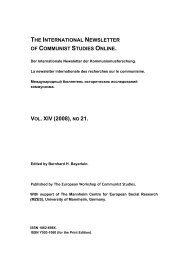11RXNdQ
11RXNdQ
11RXNdQ
You also want an ePaper? Increase the reach of your titles
YUMPU automatically turns print PDFs into web optimized ePapers that Google loves.
You Are Wonderful* 27<br />
Government has made a gesture, Monsieur Mollet has declared himself to be ‘deeply<br />
shocked’, he says that he wants light shed on the whole affair. We believe this and we are<br />
excusable: a man’s word is made to be believed; we do not believe it and we are even<br />
more excusable: M. Mollet’s word is made to be doubted. We know that the Commission<br />
will be made up of irreproachable men, we also know that it will be unable to do<br />
anything: their decency enables us to conceal its impotence from ourselves. Thus we<br />
deny the Government our trust, and yet we count on it to dispel our mistrust.<br />
Guilty. Twice guilty. We already feel prey to a vague malaise. It is not yet horror but a<br />
feeling that horror exists, very close by, all the more threatening because we cannot and<br />
will not look it in the face. And then, all at once a flash which makes it blindingly<br />
obvious: ‘What if it were true?’ Apart from that, still wonderful: but now suspect. Yes,<br />
each one of us finds his neighbour suspect and fears being considered suspect by his<br />
neighbour. Regarding the solution to the Algerian problem, friends could hold different<br />
opinions but still think highly of each other. But what about the summary executions?<br />
The torture? Can you remain friends with someone who approves of them? Everyone<br />
keeps quiet, everyone looks at their neighbour who keeps quiet, everybody wonders:<br />
‘What does he know? What does he believe? What has he decided to forget?’ Except<br />
among people ‘on the same side’, we are afraid to speak. What if I were to find a criminal<br />
acquiescence in the man who has just shaken my hand? This man says nothing; he who<br />
says nothing consents. But I do not say anything either. What if, on the contrary, it were<br />
he who reproached me for my spinelessness? Mistrust teaches us a new solitude: we are<br />
separated from our fellow citizens by the fear of having to despise or of being despised. It<br />
is one and the same thing, moreover, since we are all the same and are afraid of<br />
questioning people because their response might well reveal our degradation. If, for<br />
example, one of them, without violence, to rid himself as quickly as possible of his<br />
anguish, says to us, under his breath: ‘And what about the fellagha, then? Have they not<br />
carried out atrocities?’ We understand at once that fear, denial, silence have made us<br />
return once more to the barbaric times of an eye for an eye. In a word, the French have a<br />
troubled conscience – with the exception, perhaps, of M. Mollet. And that is what makes<br />
us guilty: the turmoil in our minds, the game of hide and seek that we play, the lamps that<br />
we dim, this painful bad faith; let us not see in this our salvation but the sign of a<br />
profound collapse within ourselves. We are sinking. We are already furious at knowing<br />
that we are judged and our anger makes us sink further into complicity: ‘America has no<br />
right to speak! If we treated our blacks the way they treat theirs!’ … It is true. America<br />
has no right to speak; nor does Sweden, which has no colonies. Nobody has the right to<br />
speak, but we have the duty to do so; yet we do not speak. There are honest, courageous<br />
informers, who tell what they know every day or every week: we want to ruin them or put<br />
them in prison, and their audience does not increase. But what has become of the great<br />
virtuous voices which resounded like church organs last November? At that time we were<br />
still wonderful: we drew from our innocence indignant tones to condemn – with<br />
justification – Soviet intervention in Hungary. But did you not also, great voices, in your<br />
sublime thunder, make the commitment to tell us everything there was to know about<br />
ourselves? Because you know. You do not even have the excuse of ignorance. You are<br />
familiar with the documents, the accounts. Today we are the ones who are implicated.<br />
We are the ones who need to know, to believe. We are the ones whom you can rid of our




